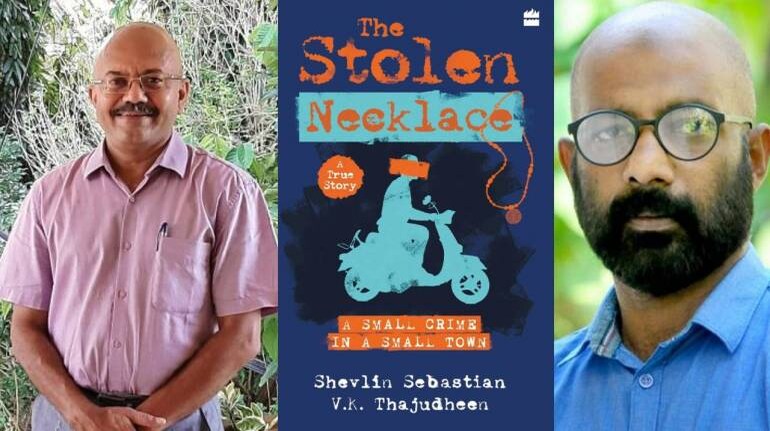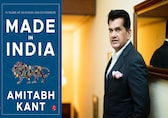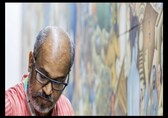A Kerala story | ‘If it could be Thajudheen, it could also be you’: Author Shevlin Sebastian
In his new book, ‘The Stolen Necklace’, veteran journalist Shevlin Sebastian tells the real-life story of VK Thajudheen, wrongfully incarcerated for 54 days in 2018 for an alleged necklace theft, mistaken for a thief based on a CCTV image. He lost everything and is still fighting for justice.

(From left) Shevlin Sebastian; his book 'The Stolen Necklace'; VK Thajudheen, on whose life the book is written
Someone known to me was imprisoned for a crime he did not commit. His family faced unbearable agony, given that he was not only the sole earning member of the family but also because he was innocent. However, the latter is a statement that can be questioned because it has elements of unrecognised bias in it.
When this person finally got bail, he told me that most people languishing in the jail premises have been falsely implicated under a criminal offence because someone had to be put behind bars. Some of these inmates have gotten used to the premises because they’ve given up hope, he told me. They know that no one can fight for them, and he felt fortunate that he had people and resources who stood up for him and got him out.
Something very similar happened with VK Thajudheen, a middle-aged man, who came back to his hometown from Doha for his daughter’s marriage. But little did he know that he’d be jailed for months for a crime he didn’t commit: stealing a necklace. The CCTV coverage presented his lookalike, and police were convinced it was no one else but Thajudheen who stole the necklace. While the police tried to extort money for him “to settle matters”, Thajudheen wanted his name to be cleared because he believed that truth shall prevail.
In The Stolen Necklace: A Small Crime in a Small Town (HarperCollins, 2023) veteran journalist Shevlin Sebastian tells his story. A poignant tale, which reads almost like fiction, narrates events as they unfold, shares relevant backstories and notes down a similar situation in the United States and what can be done to do away with cases of false implications.
In an exclusive interview with Moneycontrol, he shares what compelled him to tell this story. Edited excerpts:
RELATED STORIES
From the vast number of cases of false implications and mistaken identities, what drew you towards Thajudheen’s story?
I selected the Thajudheen story because it was from Kerala and closer to home. We could get a wavelength easily. What intrigued me the most with this case was the conclusion one could draw — if it could be Thajudheen, it could also be you.
The book almost reads like fiction. Were you able to see or distinguish yourself from a journalist reporting findings and a writer telling a story throughout your journey of working on this book?
I used both my skills: as a reporter and a short story writer. One reader said that this marriage has created a unique style.
It’s remarkable how poised and optimistic Thajudheen remained throughout, but he was one of the lucky ones who happened to be well-connected and received support. Many people, especially the poor and the marginalised, may not have access to the people and resources he had. In such cases, how can their stories of wrongful imprisonment be brought about? And what can be a way to prevent authorities from staging the very people they’re put in place to protect as criminals?
It is true that Thajudheen was very lucky because of the powerful support he received. It is also true that the poor have suffered enormously over the decades at the hands of the police. The only way is if civil society can fight for justice on their behalf.
On multiple occasions, Thajudheen calls for a better prison environment for the jailmates’ mental well-being. However, one of the incidents from his youth also shows how little importance our society places on mental health. What do you think can be done to enable people to take mental health seriously, especially by institutions like the police and investigative agencies, as, ultimately, they’re dealing with people?
Regarding awareness of mental health, the media should do more stories about this. Mental health professionals should hold classes for law enforcement to create awareness. There has to be constant refresher courses which need to be conducted for the police, so that they develop a sensitivity towards the sufferings of people. Their problem is that they work long hours, under great stress and they are always short-staffed.
You share the statistics of Thajudheen’s story going viral on social media. In that regard, what does it mean to report on something sensitive in the age of sensationalising stories via social media?
In the age of sensationalism, I tried to write the truth. I avoided using provocative language. I tried to use simple sentences, so that readers can follow the train of thought. I believe simplicity has its own charm.
Sometimes social media is a good tool to fabricate a false story, and at other times, it comes across as the only solution to gain solidarity when everything fails, and in both cases, a vast majority has already given their verdict, then how do you view this as a tool for justice delivery?
Social media is a double-edged sword. It’s good and it’s bad. But we have to take the risk. Because it is only through social media (that) we can get the message across.
Are there any organisations in India like the Innocence Project in the United States, and, if not, what do you think can be done here to prevent wrongful arrests?
There is no Innocence Project in India. Only awareness of the need for one by journalists and civil society can make a difference.
Have Thajudheen’s family members read this book?
The family has not yet read the book.
SAURABH SHARMA is a freelance journalist who writes on books and gender.



No comments:
Post a Comment